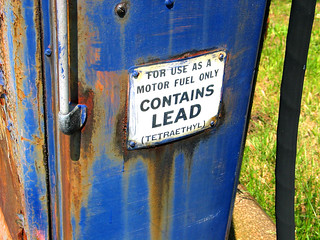 Studies have shown a strong connection between the phase-out of lead in gasoline starting in the mid-1970s and a plunge in violent crime in the following decades. As Kevin Drum reports at Mother Jones, a new study is connecting lower levels of childhood lead exposure to a later drop in the teen pregnancy rate:
Studies have shown a strong connection between the phase-out of lead in gasoline starting in the mid-1970s and a plunge in violent crime in the following decades. As Kevin Drum reports at Mother Jones, a new study is connecting lower levels of childhood lead exposure to a later drop in the teen pregnancy rate:
For years conservatives bemoaned the problem of risky and violent behavior among children and teens of the post-60s era, mostly blaming it on the breakdown of the family and a general decline in discipline. Liberals tended to take this less seriously, and in any case mostly blamed it on societal problems. In the end, though, it turned out that conservatives were right. It wasn’t just a bunch of oldsters complaining about the kids these days. Crime was up, drug use was up, and teen pregnancy was up. It was a genuine phenomenon and a genuine problem.
But liberals were right that it wasn’t related to the disintegration of the family or lower rates of churchgoing or any of that. After all, families didn’t suddenly start getting back together in the 90s and churchgoing didn’t suddenly rise. But teenage crime, drug use, and pregnancy rates all went down. And down. And down.
Most likely, there was a real problem, but it was a problem no one had a clue about. We were poisoning our children with a well-known neurotoxin, and this toxin lowered their IQs, made them into fidgety kids, wrecked their educations, and then turned them into juvenile delinquents, teen mothers, and violent criminals. When we got rid of the toxin, all of these problems magically started to decline.
Today, we’re debating whether to cut the toxic heavy metal and carbon pollution from coal by shutting down the oldest, dirtiest coal-fired power plants. But the benefits aren’t hidden – we know coal kills thousands of people every year and causes thousands more asthma attacks in children.
Electricity rates and jobs are obviously important, but why do reporters talk almost exclusively about those, and hardly at all about these very real impacts on our lives? When did human health become a sidebar story?




![Monday News: Trump’s Lunacy Pushes China, Russia, India, etc. Together; “Happy Labor Day. Donald Trump and Elon Musk Are Screwing Workers.”; “Where is the [media’s] intense focus on Trump’s failing health?”; ““Trump says he is not a dictator. Isn’t he?”](https://bluevirginia.us/wp-content/uploads/2025/09/montage0901-238x178.jpg)









